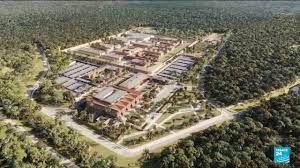By Hassan Osman Kargbo
France will construct a €400 million high-security prison in its overseas department of French Guiana to house drug traffickers and radicalised inmates, the country’s justice minister has confirmed. The move comes amid rising violence linked to organised crime and a spate of attacks on prison personnel across the country.
Justice Minister Gérald Darmanin announced the project during a visit to French Guiana, outlining plans for the facility to be built in a remote, densely forested area near Saint-Laurent-du-Maroni, close to the Surinamese border. The prison, expected to be operational by 2028, will serve as a critical part of France’s broader strategy to clamp down on drug networks and the growing threat of radical Islamism within its prison system.
Speaking to Le Journal du Dimanche (JDD), Darmanin said the prison would be designed to disrupt all levels of the drug trade supply chain, from street-level dealers to international traffickers and their financiers. “We are targeting organised crime at all levels,” he told the newspaper. “This new prison will help us isolate and neutralise the most dangerous individuals who threaten the fabric of our society.”
The decision follows a series of high-profile incidents involving gang-related violence and escalating security concerns in French correctional facilities. In recent months, prison guards have been assaulted, and violent uprisings have raised alarm about the growing influence of criminal networks behind bars. The government has faced increasing pressure to act decisively in restoring order and ensuring staff safety.
French Guiana, a French territory in South America, has long grappled with issues related to illegal mining, cross-border trafficking, and a fragile social infrastructure. Its location makes it a strategic point for drug smuggling routes from South America to Europe. The justice ministry sees the new facility as a way to project state authority in the region while addressing broader national security threats.
The prison will be constructed deep in the Amazon rainforest, with an emphasis on isolation and security. While specific details of the facility’s design remain under wraps, it is expected to feature advanced surveillance systems, reinforced perimeters, and segregation units for high-risk inmates, including individuals convicted of terrorism-related offences.
Critics of the plan have raised concerns over the environmental impact of building a large complex in one of the world’s most biodiverse regions. Others have questioned whether the project will address the root causes of crime or merely serve as a symbolic gesture of state power.
However, supporters argue that the move is both necessary and overdue. “We can no longer allow our prisons to be breeding grounds for violence and radicalisation,” said one union representative for prison staff. “This is a step toward regaining control.”
As the government moves forward with the project, it has pledged to work with local authorities to minimise disruption and ensure the facility contributes to the economic development of French Guiana.
The new prison marks one of the most ambitious justice infrastructure investments in French overseas territories in decades and reflects the state’s growing emphasis on security, deterrence, and regional presence.










